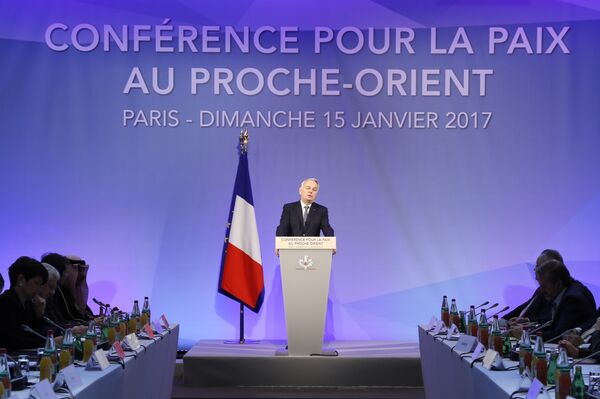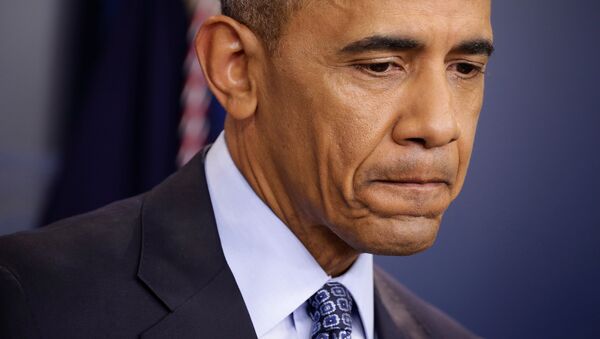The prospect of a two-state solution to the Israel-Palestine quarrel is rapidly diminishing because of ongoing Israeli settlement expansion, Barack Obama said in his final presidential press conference — but an expert on conflict resolution has told Sputnik it remains the best option for Israelis and Palestinians alike.
Explaining his motivation for breaking with tradition and not blocking a UN Security Council (UNSC) resolution on Israeli settlement activity in December 2016, the outgoing-President said it was important to send a "wakeup call" to Israel, and make clear the opportunity to secure resolution on the issue was fading. He cited a "rightward drift in Israeli politics," as well as the rise of terrorist groups in the region as the key reasons for the peace process' failure to advance.
Obama: there is no alternative to a two-state solution. If you don't give Palestinians a state they wind up as second-class non-citizens.
— Joy Reid (@JoyAnnReid) January 18, 2017
While he went on to declare the status quo was "unsustainable," and he does not see an alternative to the two-state solution, the obvious substitute is the one-state solution, support for which has been rising among Israelis and Palestinians alike in recent years.
In August 2016, a survey conducted jointly by the Palestinian Center for Policy and Survey Research in Ramallah and the Jerusalem-based Israel Democracy Institute showed a quarter of Israelis and 35 percent of Palestinians were amenable to the possibility of a binational state. Support for the idea is highest among Israeli Arabs, at 52 percent.
Proponents allege it would be the most effective way of upholding Palestinian rights, and their internationally-recognized right to return to lands they were expelled from following Israel's establishment as a state in 1948.
Nonetheless, Dr. Jacob Eriksson, a lecturer in Post-war Recovery Studies at York University, says a two-state solution "remains the best option" — although he identifies several issues hampering its attainment.
"A one-state solution is theoretically interesting, particularly as a two-state solution seems unlikely — despite the UNSC resolution, Israel refused to take part in the Paris conference, and settlement expansion continues, so it's difficult to envisage. Ultimately though, it remains the best alternative for Israelis and Palestinians," Dr. Eriksson told Sputnik.
On top of overt Israeli intransigence, Eriksson noted there are distinct cleavages within Palestinian politics, particularly in respect of Fatah and Hamas, Palestine's primary political parties.
"The ongoing conflict between the two affects the situation in a number of ways. While Fatah is pushing Hamas to accept the Quartet Principles, namely by recognizing Israel, both have differing attitudes to reconciliation and both have different regional sponsors — Hamas has a strong relationship with Egypt, for instance — and Hamas not been willing to allow Fatah to fulfil power roles in Gaza," Dr. Eriksson said.

The stubbornness of the two factions, Dr. Eriksson added, is creating — or, perhaps, exacerbating — disillusionment in Palestinian society.
"In Gaza, there hasn't been widespread improvement since the destruction wrought by the 2014 war with Israel. Some blame Hamas, arguing they haven't fulfilled their responsibility to the people in the Gaza Strip, while others blame the continuing political standoff. What's clear is there's an old generation that has dominated Palestinian politics, particularly Fatah, for a very long time, and Palestinians are becoming visibly frustrated. They're saying, 'this is an outdated leadership that doesn't speak for the new generation of Palestinians.' There's hope for a new direction, and the creation of a unified Palestinian voice, but that may not be achievable while we remain stuck with competing Palestinian nationalisms," Dr. Eriksson told Sputnik.

On the prospect of another Palestinian election, which has been postponed since July 2010 by authorities on the basis of "safeguarding national unity," Dr. Eriksson said it was difficult to say whether a new political faction could rise up, but it will be interesting to see what platforms parties run on — whether their programs will be internally and externally focused.
Conversely, Dr. Eriksson said, the "international community" could always reject the result, as happened in January 2006 when Hamas won a majority of parliamentary seats.


